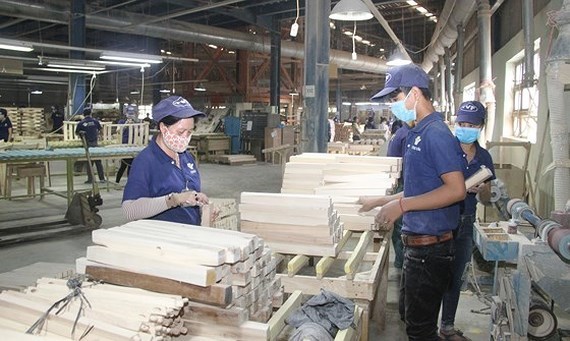 |
However, according to many enterprises, in long term, the US market is no longer a potential and comfortable market.
Representative of the Vietnam Association of Seafood Exporters and Producers said that after 2016, exporting goods into the US market has gradually become more difficult, starting from when the US Food and Drug Administration changed regulations on food safety.
Accordingly, foreign enterprises which want to export to the US market must have legal entity or representative legal entity in the US granted by the US Government.
Just by this regulation, nearly 800 Vietnamese enterprises which have been exporting goods to the US for a long time are eliminated from this market. In addition, stricter technical barriers on food safety, packing specification and produce traceability have caused small-sized enterprises fail to meet the requirements.
For instance, regulations on produce traceability require firms to ensure that their products can be traceable from input materials, processing, transport and import to a retail location where they are purchased by consumers.
Representative of Nutifood said that, in order to meet the US food safety standards, the company has had to invest new production line with total cost of nearly US$2 million.
Some Vietnamese with stronger financial potential opted for joint venture solution or building factories in the US. However, the number of Vietnamese enterprises which are able to reinvest or invest directly as above can be counted on the fingers of one hand.
According to several, not only do technical barriers case difficulties but export firms also have to face with various trade defense lawsuits. Currently, steel products imported from Vietnam are applied anti-dumping duty of up to 250 percent.
Pangasius fish and shrimps are imposed antidumping tax annually. There was time when antidumping tax levied on shrimp products was 25 times higher than previous one and that on pangasius fish was $7.47 per kilogram, 9.7 times higher than previous import tax level.
Moreover, several other products are on the verge of facing with trade defense lawsuits, such as garment, textile, footwear, industrial processing and manufacturing products, seafood and agricultural products. The two latest export products of Vietnam that were investigated by the US for antidumping are plywood and packing.
In order to reduce impacts of changes in policy in the US market, especially in order to avoid the risk of being imposed antidumping tariff due to losing trade defense lawsuits, several Vietnamese enterprises have actively withdrawn from this market.
Representative of the Food and Foodstuff Association of Ho Chi Minh City said that retreating early from the US market is also a solution to help enterprises to avert the chain reaction of trade defense lawsuit and antidumping tax levy in other export markets.
According to warnings of economic experts, although export turnover to the US market still posted growth, this is no longer a potential and comfortable market for export companies.
Therefore, in order to be active in production, firms need to expand and search for new markets. Markets which are considered to be favorable in both tariff and technical barriers include Canada, Australia, the EU, Japan, South Korea, China, Thailand, Malaysia and other countries in the Asian and European region.
Dr. Huynh Thanh Dien from the University of Economics Ho Chi Minh City emphasized that advantages at new markets are obvious.
However, in the long run, firms need to meet global standards in production, products, technology and production management. In order to do that, firms have to take advantage of the fourth industrial revolution to change the method of production, marketing, distribution and corporate administration.
Especially, they have to improve distribution network in global market because it is the biggest weakness of Vietnamese export companies. For that, they will be able to create advantage to overcome the current situation.
Figures by the Ministry of Industry and Trade showed that nearly 150 trade defense lawsuits against products imported from Vietnam have been carrying out by 18 countries and territories. Of which, there were 27 cases in the US, accounting for about 20 percent of total lawsuits. SGGP
Thuy Doan
 The US Government has recently increased import tariffs on goods imported from China which in short term might create certain advantages for exported goods of Vietnam.
The US Government has recently increased import tariffs on goods imported from China which in short term might create certain advantages for exported goods of Vietnam.